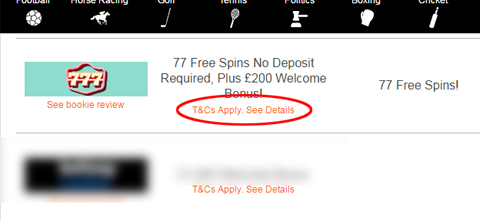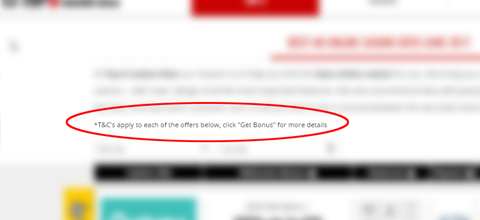GB Regulation Marketing Guidelines for 888 Affiliates
Set out below is a summary of the key advertising rules and regulations that apply to your advertising of 888’s websites to customers in the United Kingdom and the guidelines that you should follow in complying with these. This document is not a substitute for you reading the applicable rules, regulations and regulatory guidance that apply to your advertising, including but not limited to the CAP Code, CAP’s 'Guidance on the rules for gambling advertising' and the ‘Gambling Industry Code for Socially Responsible Gambling’.
Any failure to comply with any advertising regulation or rule, or the guidelines set out in this document, constitutes a breach of the Uffiliate Scheme Affiliate Agreement and may result in termination of your membership in the Uffiliate Scheme. If you are in any doubt as to your obligations under the Uffiliates Scheme Affiliate Agreement, the guidance in this document, or the applicable advertising rules or regulations, you should contact 888 and seek approval before publishing the relevant advert.
Marketing prohibitions
You must ensure that all adverts that you publish in relation to 888 do not:
- link gambling to seduction, sexual success, resilience, recklessness or enhanced personal qualities;
- exploit cultural beliefs or traditions about gambling or luck;
- portray gambling as taking priority in life;
- condone or feature gambling in a work environment;
- suggest that gambling can be a solution to personal or financial concerns;
- suggest that solitary gambling is preferable to social gambling; or
- have particular appeal to children and/or young people (under-18s). Cartoon animals and characters from, or similar to those from, children’s TV, films, nursery rhymes and fairy tales, are likely to be deemed of ‘particular appeal to children’. Further guidance in this respect can be found here.
Misleading advertising
You must ensure that all adverts that you publish in relation to 888 do not:
- mislead a consumer and are likely to do so; and
- hide “material information” or present it in an unclear, unintelligible, ambiguous or untimely manner. “Material information” is information that consumers need in context to make informed decisions about whether or how to take part in a promotion, place a bet or register/deposit.
You must ensure that all adverts state any significant limitations or qualifications. Any qualifications may clarify but may not contradict the claims they qualify.
Significant terms of ‘free bet’ and ‘bonus’ offers
- Terms and conditions relating to consumers' understanding of a ‘free bet’ or ‘bonus’ offer and of the commitments that they have to make in order to take advantage of such an offer are considered “material information” and should be stated in the advertisement itself. These terms are called “significant terms” in this guidance.
- Examples of significant terms include, but are not limited to the following: the minimum deposit / wager / bet amount required to qualify for the bonus or free bet; any wagering requirements in order to cash out the bonus or associated winnings; any time period during which bonus/free bet must be used before it expires; any restrictions on use of free bets or bonuses; any restrictions on bets that must be placed in order to qualify for a free bet (such as on certain markets at certain odds); any limitations on which players are eligible for a promotion (such as funded players only); and the end date of the promotion.
- You must ensure that all significant terms are included within the advert itself. Significant terms must be displayed prominently. In particular, check their placement is prominent (above the fold) and the colour, font and size of the text means they will not be missed by the consumer.
- If, due to significant time or space restrictions (for example, a banner advert), you cannot include all significant terms in the advert itself, then you must:
- include as many significant conditions in the advert as is practicable;
- include the words “T&Cs apply” in the advert itself; and
- direct consumers clearly to an easily alternative source where all the significant terms of the advert are prominently stated. For online adverts, you should state insert a URL to a landing page or terms page on the applicable 888 website where the significant terms are set out (ideally by making “T&Cs apply” a URL). This webpage must be no more than one click away from the advert and the significant conditions must be above the fold on this page.
- For comparison tables either of the following solutions is appropriate:
- Place “T&Cs apply” wording and a URL to a webpage that includes the significant terms next to each 888 offer as follows:

- Add “T&Cs apply to each of the offers below, click [‘Get Bonus’] for more details” as a disclaimer to the entire comparison table as follows:

- Place “T&Cs apply” wording and a URL to a webpage that includes the significant terms next to each 888 offer as follows:
General guidelines for ‘free bet’ and ‘bonus’ offers
In addition to the above, when advertising a ‘free bet’ or ‘bonus’ offer, you must ensure that the advert also complies with the following guidelines:
- An advert must not describe something as “free”, “gratis”, or “without charge” (or similar) unless it genuinely is.
- If you are advertising a bonus which is only granted if the player makes a deposit, you should not describe that bonus as “free”. Where applicable, however, you may use the terms “FreePlay”, “FreeSpins”, “FreeBets” and “FreeRoll” when advertising these types of bonus funds (you should not, however, use the word “free” to describe them other than use within the name of the bonus itself).
- If a bonus is granted without payment, you may use the word “free” to advertise it but you must specify what is being granted (for example “Free Bonus”, “Free Ticket”, or “Play with £888 Free”) and what players need to do to receive it (“register”, “claim” or “play”).
- You should never suggest that cash is being granted when it is not. You should never state bonus amounts on their own without specifying what the amount relates to (for example, state “Get $100 bonus” or “Get £100 FreePlay” not “Get $100” or “Get £100”).
- If a bonus is granted as a proportion of the player’s deposit but is capped at a maximum amount, you must state the maximum amount that it is capped at (for example, state “100% up to £400” or “Get a 50% bonus up to £20”).
- If “cashback” is granted but not as real money (i.e. the cashback is in the form of a bonus or free bet), you must clearly state this in the main offer of the advert (for example, state “cash back as free bets” not “cash back”).
- If the player needs to win the bonus (for example, by playing a game), rather than simply being granted it (for example on registration or claim), you must state “win” in the ad itself (for example, state “win £20 bonus” not “get £20 bonus”).
- You must never suggest that a bet or wager is without risk. In particular, you must never use the following terms in any adverts (or any similar terms): “Risk free”, “No risk”, “Safe bet” or “No lose”.
Recognition of marketing communications
You must ensure that all adverts that you publish in relation to 888 are obviously identifiable as adverts and that they comply with the following guidelines in this respect:
- You must not include any non-genuine consumer reviews or comments in relation to 888 (including social media comments, such as Facebook) in your adverts.
- If you do include a review or comment that is not genuine, you must clearly and prominently state that it is not. You must include the following on each review and/or comment: "This review/comment is a promotional feature written by us which has been paid for by 888 and is not provided by an independent consumer".
- An advertorial (or ‘advertising feature’) is a piece of content in editorial space which is paid for by a brand and over which the owner of the brand exercises a degree of editorial control (i.e. either writes it, tells the publisher what to say or reviews and approves the content before it’s published). If you publish any advertorial on behalf of 888, you must clearly state that it is an advertorial by labeling it prominently with the word(s) “Advertorial” or "Advertisement feature“ (or #ad for social posts).
- For comparison tables, you must include the words "Advertiser Disclosure" in a prominent position above or below the table and using a sufficiently large font size. It must be clear that the wording relates to the specific section of the content which has been paid for by 888. You must ensure that when a consumer clicks “Advertiser Disclosure” a pop-up appears which contains the following additional information: “This comparison site is supported by payment from operators who are ranked on the site and the payment impacts the ranking of the sites listed”.

To report misconduct by any of our affiliates please contact us. Learn more about our Ethical Marketing Practice Policy.
888affiliates is an integral part of the Uffiliates program that also promotes the exclusive brands owned by Dragonfish.
888affiliates - Mobile App Privacy Policy | 888 Affiliate Privacy Policy | Top 15 Marketing Guidelines | Industry Keyword Black List
© Copyright 2014 888affiliates. All rights reserved.






